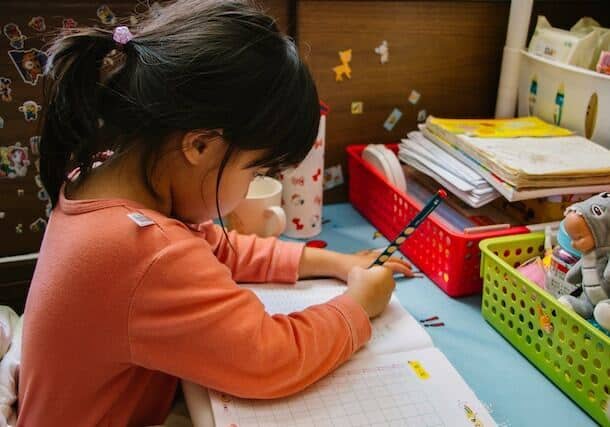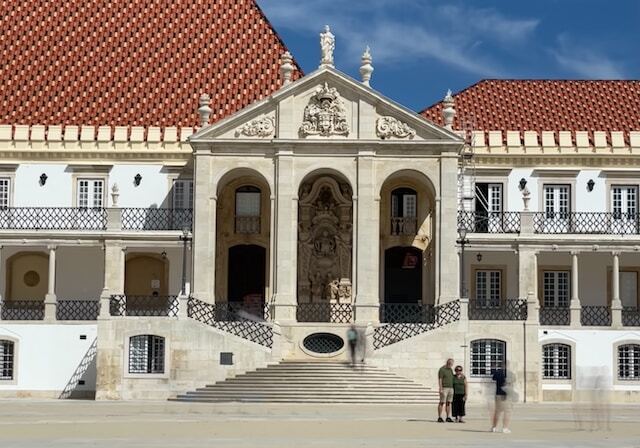Navigating the educational landscape when relocating to Portugal can be a pivotal concern for families. Fortunately, the Portuguese education system stands as a beacon of excellence. You’ll be happy to know that Portugal’s primary schools, secondary schools, universities, kindergartens, and other educational institutions are of a high standard.
From primary schools to prestigious university institutes, Portugal offers a robust and high-quality array of options. In this guide, we delve into the intricacies of the Portuguese education system, providing insights into the structure from pre-school to higher education. Whether you’re seeking information on scholarships, financial aid, or contemplating a change of schools in Portugal, this article aims to be your comprehensive resource for understanding and navigating the educational landscape in this vibrant European country.
Here’s what we’ll cover in this guide:
- An overview of the Portuguese education system
- The structure of Portugal’s schooling — from pre-school to higher education
- Tips on how to change schools in Portugal, and more!
Portuguese Education System: An Overview

The education system in Portugal includes both public and private institutions. The Ministry of Education (Direção-Geral da Educação – DGE) regulates the education system in Portugal, starting from pre-school up until secondary school. School groups (agrupamentos escolares) also work closely with local municipalities to assign funding and define the curriculum. The Ministry of Science, Technology, and Higher Education (Ministério da Ciência, Tecnologia e Ensino Superior – MCTES) oversees policies and budgets for higher education.
You will find a mix of state (free fees) and private (fee-paying) education in Portugal. You can enroll children in preschool before they join a school at the mandatory age of six. For instance, 92 percent of children attended preschool in Portugal in 2019, higher than the OECD average of 88 percent.
Although the primary educational language in state schools is Portuguese, the country offers many options for expats to register in international schools. This might make it easier for their children, as they can join schools speaking their native language. Also, if there is the possibility that you may return to your home country in the future, your child or children will be familiar with the curriculum, which will make the process of moving schools a bit easier.
Understanding the different stages of the Portuguese educational system and all the available options for your children is fundamental in deciding where to send them.
The structure of education in Portugal
You can enroll your child in either a private or public school in Portugal. If you pick a private school, you can check to see whether it’s certified by the relevant ministry.
Regardless of whether you choose a state school or a private one, the education system in Portugal is the same. It consists of four stages and comprises the following educational levels:
- Preschool education (Educação Pré-escolar): Ages 3 to 6
- Primary education (Ensino Básico): Ages 6 to 15
- Secondary education (Ensino Secundário): Ages 15 to 18
- Higher education or tertiary education (Ensino Superior): Ages 18 and above
School is mandatory from the ages of 6 to 18. After this, students can decide whether they want to continue on to university. Even if your children are in international schools, we recommend that they learn Portuguese. The state offers free language courses and support to help children become more familiar with Portuguese from a young age.
Portugal school fees
Wondering how much it costs to study in Portugal? Public schools up to a certain education level are tuition-free for citizens and foreign residents alike. However, if you’re considering private schooling, be prepared for varying costs, with the private school tuition ranging between €400 and €500 per month from primary to high school level.
Moving on to higher education, public university institutions generally charge tuition fees for Bachelor’s and Master’s programs, typically falling between €1,000 to €1,500 per academic year for EU/EEA students. For non-EU/EEA foreign students, these fees may be slightly higher, often falling between €3,000 and €5,000 per academic year. Conversely, private universities tend to have higher tuition fees, ranging from €3,000 to €12,500 per academic year, applicable to both EU/EEA and non-EU/EEA foreign students.
If you’re considering an international school for your children, be prepared for higher tuition fees. Monthly costs typically hover around €800. The minimum monthly fee at an international school in Portugal is around €40, but these prices can escalate to as much as €1,800 depending on the school level. Make sure to also factor in potential costs for uniforms, books, and other school supplies as you budget for education in Portugal.
Portugal education system problems
Unfortunately, there is a shortage of places in creches for children under the age of three. The waiting lists for government-subsidized creches can seem hopeless, as these are far more popular than private preschools.
If you are planning on starting a family in Portugal, we recommend that you pre-register your baby as soon as possible. Many creches allow this, but we warned this still doesn’t guarantee a spot as families with children already enrolled in a certain creche have priority. To avoid the long wait lists, we’d recommend choosing a private preschool.
Pre-school Education in Portugal

Pre-school education (Educação Pré-escolar) is free for 25 hours a week from the age of three. However, private pre-schools, including international schools, Montessori, and Waldorf institutions, charge tuition fees.
The Portuguese government introduced a new scheme in 2022. All daycare centers in the social sector will be free for all children born on or after 1 September 2021. Children will be provided with a basic education, including food, insurance costs, and physical education, with no tuition fees. The scheme aims to cover 100,000 children by 2024, with no differentiation between family income.
Although preschool is optional, working parents might choose this option if they’re too busy to home-school and because preschool can help prepare children for primary school, both socially and psychologically.
Basic Education/Primary Education in Portugal
Primary education or basic education (Ensino Básico) in Portugal is universal, free of charge, and compulsory, spanning nine years of schooling (from 6 to 15) and comprising three consecutive cycles. Each cycle, including the initial four-year span (grades one to four), aims to progress from a global perspective, building upon prior knowledge and skills.
There is an extensive network of private and international primary schools in Portugal providing basic education, and you can probably find one or two schools close to where you live.
The primary school system in Portugal
The three cycles of primary education in Portugal last four, two, and three years, respectively. All children aged six by 15 September must be enrolled in school for that calendar year. Primary school is also known as elementary school.
The Ministry of Education supervises all policies regarding state schools. The three primary cycles (escolas básicas) are as follows:
• First cycle (primeiro ciclo or 1º ciclo): Grades 1 to 4
This cycle of basic education lasts for four years, and one single teacher is responsible for teaching students.
• Second cycle (segundo ciclo or 2º ciclo): Grades 5 to 6
This cycle lasts for two years, and different teachers are responsible for teaching a wide range of subjects.
• Third cycle (terceiro ciclo or 3º ciclo): Grades 7 to 9
The third cycle lasts for three years, and one teacher is responsible for teaching the given subject area. This cycle covers vocational studies also. At the end of this cycle, a diploma/certificate is awarded.
Public primary schools in Portugal

The national curriculum is similar for all public schools across the country. Pupils in public education study Portuguese, mathematics, science, history, geography, and English, a mandatory subject in the national curriculum. This may be why Portugal has become one of Europe’s top ten English-speaking countries. Additionally, from Grade 7, students can study another foreign language, usually French or Spanish.
It is essential to note that you must choose a school close to your residence or place of work. Furthermore, when applying, you must show proof of your address. There can also be waiting lists, especially for popular public schools, so it’s best to register early.
It’s worth mentioning that Portugal public schools have a great reputation. Still, international students who don’t speak Portuguese as their native language will struggle to understand what is said in class. Expat parents can send their children to international schools in Portugal or learn Portuguese themselves and assist their children in learning the language to fluency.
Private primary schools in Portugal
Private schools in Portugal allow children to study in their native language and interact with other children worldwide. It also gives them continuity in their education if they relocate to another country or return home.
The advantages of private schools are smaller class sizes, a more robust system of extra-curricular activities, and more modern facilities. Some even offer boarding options.
International schools are top-rated with Golden Visa residents due to their high education standards and variety of curricula.
They often have strict admissions processes, varying from school to school; some require entrance exams, past school records, and even a personal interview. Many parents choose this option, confident that their children will receive a world-class education that ensures that they can compete with their peers across the globe when the time comes for university-level higher education.
If you’d like to look into international schools, check out our comprehensive guide to international schools in Portugal here.
Secondary Education in Portugal
Secondary education in Portugal is considered mandatory education. This educational level is mainly to enhance the children’s level of knowledge and improve the skills they already gained in primary school. This stage of education is critical because it prepares the students for higher education and the job market.
The secondary school system in Portugal
Secondary education lasts for three years, from Grade 10 to Grade 12, and to get admittance into this level, students must hold a certificate of primary school education. This educational level comprises general courses, artistic, and vocational or technical courses.
National exams
Secondary education is completed when students pass all of their subjects. Internal assessment grades count towards 70 percent of their final grade, with the remaining 30 percent based on four mandatory national exams.
Students are expected to sit two finals in Grade 11 (depending on the scientific/humanities courses chosen) and two in Grade 12 (in Portuguese and another subject of their choice). Upon completing these examinations, students receive a diploma and certificate.
National exam results are used for admissions to third-level education
Public secondary schools in Portugal

Students can choose between vocational (Cursos Profissionais) or science-humanities streams (Cursos Científico-Humanísticos). Those following the Cursos Profissionais study to achieve trade qualifications, gaining direct access to careers in the fields of IT, design, or hospitality.
Meanwhile, Cursos Científico-Humanísticos streams are more academic and include subjects like visual arts, sciences, and humanities. Students looking to pursue a career in a creative field can also choose the third option and take a specialized artistic course (Cursos Artísticos Especializados).
Private secondary schools in Portugal
Private secondary schools in Portugal are run by independent organizations, such as religious orders or private companies. Private schools tend to have a more personalized approach to teaching, with smaller class sizes and more one-on-one attention from teachers. In exchange for tuition fees, private institutions tend to have access to more resources than public secondary education institutions, such as modern classrooms and technology-based learning tools.
Private schools are often seen as the best way for students to prepare for higher education and to pursue their chosen career paths. They provide a more challenging academic environment and can help students develop the skills and knowledge they need to succeed in the future.
Below are the types of private schools in Portugal.
Religious schools in Portugal
Religious schools in Portugal are run by religious orders, such as the Catholic Church. These schools provide a strong moral and religious education, teaching students about their faith and the importance of faith in their lives. Religious educational institutions also focus on teaching students the core subjects, such as Math, Science, and Languages. However, they also teach students about the history and culture of their faith and how it influences their lives.
These schools give students an insight into the traditions and beliefs of their faith, helping them to develop a deeper understanding of their religion.
Many parents choose these schools because they perform better in the annual exams (in Portuguese) and offer a wider range of extracurricular activities.
International schools in Portugal in Portugal
International schools are the best option for expats living in Portugal. These schools offer a multicultural environment that provides international students with global skills and the ability to engage more with different cultures and learn a lot in their native languages.
Parents have the possibility to choose British, American, French, and German schools, which is ideal if they prefer their child to learn in their home language or be familiar with the curriculum. There are also adaptive learning schools and other types of schooling, so don’t fear that they’ll be a lack of options on the table.
International schools are an important component of the public or private schools debate because they’re ideal for expat families. Additionally, the fees of the international schools in Portugal are relatively affordable as compared to other European countries and start at around €5,000 a year.
Some of the best international schools in Portugal include St. Julian’s School in Carcavelos and the Oporto British School.
You can see more about the international schools in Portugal, of which there are 51, in our guide on International Schools in Portugal. Note that most of these schools are focused in Lisbon, Porto, and the Algarve.
Boarding schools in Portugal
Families looking for boarding schools in Portugal will find prestigious schools, each as unique as the students who attend them. There are only a few schools of this kind in Portugal, and these are primarily located around Lisbon and the Algarve. Before applying, it is advisable to visit the school to explore the facilities and get a feel for the program. Tuition fees are typically around €30,000 a year.
International Baccalaureate (IB) in Portugal

Students graduate from secondary school with an IB. The course develops children’s creativity and forges a sense of community. The IB program is designed to provide students with a comprehensive and well-rounded education, and it is often considered an alternative to the traditional national education system. In Portugal, the IB program is offered at both public and private schools and is recognized by higher education institutes worldwide.
The Diploma Program, one of the IB programs, is a two-year curriculum that is typically taken by students in their final two years of secondary education. It emphasizes critical thinking, intercultural understanding, and independent research and is widely recognized as a challenging and rigorous program.
The IB Diploma is available at 12 schools in Portugal, including both international schools and private Portuguese educational institutions.
Higher Education Institutions in Portugal
Higher education in Portugal is well-respected worldwide. Seven of the Portuguese universities are featured in the QS World University Rankings 2021, the highest entries being the University of Porto and the University of Lisbon. Portugal’s higher education system itself ranked as the 35th best in the world in the first edition of the QS Higher Education System Strength Rankings.
Alongside its top universities, Portugal is also home to several reputable polytechnics that focus on preparing students for a specific career path and offer vocational courses. Some subjects are only offered at either universities or polytechnics. For example, natural sciences, social sciences, visual arts, and law are typically taught at universities, while fields such as tourism and social services are generally taught at polytechnics, but plenty of overlap means that both universities and polytechnics offer degrees in subjects like engineering, management, and humanities.
Most courses, especially those at a bachelor’s level, are taught in Portuguese. However, several English-language programs exist at the graduate level, mirroring trends in European universities.
Higher education in Portugal is divided into two subsystems:
Portuguese Universities
Universities in Portugal offer bachelor’s, master’s, and doctorate degrees. These higher education institutions focus on theoretical education and research. Portugal offers both private universities and public universities, but not that private universities are generally more expensive, as you’d expect.
Every higher education institution offers vacant places through unique admission processes for sportspeople, mature applicants over the age of 23, international students, and students or degree-holders from other educational institutions.
Portugal is home to some of the oldest universities in Europe, including the University of Coimbra, which was founded in 1290.
One of the most notable aspects of universities in Portugal is the emphasis on internationalization. Many universities have partnerships with institutions worldwide, allowing students to study abroad and gain a global perspective on their field of study. Additionally, many universities in Portugal offer programs taught in English, making them accessible to international students.
In terms of programs and specializations, universities in Portugal offer a wide range of options. There is something for everyone, from traditional fields such as law and medicine to more specialized areas such as renewable energy and biotechnology.
Polytechnic Institutions

Polytechnic institutes in Portugal are renowned for their strong focus on practical, hands-on learning. These institutions offer a wide range of technical courses and vocational programs that prepare students for careers in a variety of fields, including engineering, design, and technology.
One of the most notable features of polytechnic institutes in Portugal is their focus on project-based learning and conducting practical research. Students are encouraged to work on real-world projects and apply the skills and knowledge they have acquired in class to solve real-world problems. This education approach helps students develop essential skills such as critical thinking, problem-solving, and teamwork.
The curriculum at polytechnic institutions in Portugal is designed to be very flexible, allowing students to tailor their studies to their specific interests and career goals. Students can choose from various elective courses and are encouraged to participate in internships and co-op programs to gain real-world experience.
One of the most well-known polytechnic institutes in Portugal is the Polytechnic Institute of Porto, which is known for its vital engineering, design, and technology programs. The institute is also home to several research centers focusing on cutting-edge technologies such as renewable energy, smart cities, and sustainable transportation.
Choosing the Best School in Portugal for Your Children
Choosing the best school in Portugal for your children involves considering various factors to ensure a well-rounded and suitable educational environment. Here are some key considerations:
Location
Start by considering the location of the school. Look for schools that are conveniently located in proximity to your home or work to minimize commute times.
School curriculum
Different schools may follow different curricula, such as the Portuguese national curriculum, the International Baccalaureate (IB), or other international programs. Choose a curriculum that aligns with your educational preferences and future plans for your children.
Language of instruction
Determine the language of instruction at the school. While many schools in Portugal teach in Portuguese, there are also international schools that may offer instruction in English or other languages. Consider your child’s language proficiency and your family’s language preferences.
Facilities and resources
Visit schools to assess their facilities, classrooms, libraries, sports facilities, and other resources. A well-equipped and comfortable learning environment contributes to a positive educational experience.
Extracurricular Activities
Evaluate the availability of extracurricular activities, such as sports, arts, music, and clubs. These activities can play a crucial role in the overall development and engagement of your child.
School reputation
Research the reputation of the school within the local community and among other parents. Online reviews, testimonials, and word-of-mouth can provide insights into the school’s strengths and weaknesses.
School culture and values
Understand the school’s culture and values. Consider whether they align with your family’s beliefs and expectations for your child’s education.
Accreditation
Check if the school is accredited by relevant educational authorities or international accreditation bodies. Accreditation ensures that the school meets certain quality standards.
By carefully considering these factors, you can make an informed decision and choose the best school in Portugal that suits the unique needs and preferences of your children and family.
Financial Aid and Scholarships
In Portugal, students can benefit from different types of scholarships available in government and higher education institutions for local and international students.
As a member of the EU, Portugal takes part in all EU-derived scholarships, like Erasmus Mundus programs, etc. In Portugal, several private and semi-private organizations and institutes offer scholarships for study in the Portuguese language and culture, sciences, and technology.
Children from low-income families can also apply for government support in Portugal. Parents can request financial aid, known as Ação Social Escolar (ASE), through their school. They can also apply for a family allowance (abono de família).
It is worth mentioning that the Portuguese government also provides financial support for children with disabilities; their families can request financial aid to get at least one of the following subsidies through the Portuguese social security system (Segurança Social):
- Disability bonus (Bonificação do abono de família para crianças e jovens com deficiência).
- Special schooling subsidy (Subsídio de educação especial).
- Support for assistance by a third person (Subsídio por assistência de 3ª pessoa).
Children can get different financial support options to cover their school tuition fees. Parents can talk to the school management and show proof of their low-income status to discuss the available options for their children. Private universities tend to be more expensive than public universities.
Educational Support for Expat Students in Portugal
In Portugal, there is always a place for expats and their children. Hence some schools offer Portuguese language support classes for students who don’t speak Portuguese. Just be aware that this language support is not the norm in every city and only exists in bigger cities like Lisbon or Porto. Alternatively, you might want to consider schools that offer bilingual programs.
You can contact the High Commission for Migration (Alto Comissariado para as Migrações – ACM) with any education-related questions.
Support for Children with Special Educational Needs (SEN)

Children under the age of six can avail of specialized teachers coming to their homes or a kindergarten if their parents are working. They can then join a primary school and receive an Individual Educational Plan (IEP) adapted to their learning needs.
For example, it can include specific learning tools or special exam conditions. Children also receive a plan at the end of school to help them transition into adulthood. Schools with special education are available in the major cities in Portugal, where there are facilities for children who have hearing or visual impairments or developmental disabilities.
Furthermore, specific organizations can provide additional support. For example, (CADIn) is a non-profit organization that helps families whose children have neurodevelopmental disorders.
Changing Schools in Portugal
Children can change schools freely in Portugal. Your home address is one of the main requirements while applying for a new school or changing your current one. Children can change schools anytime during the year; there just needs to be a good reason for the transfer, e.g., moving area.
Portuguese Schools and Parental Involvement
Parents who want a say and involvement in their children’s school can join the Associação de Pais – Parent Teacher Association (PTA)
If you’re an expat parent, we’d recommend brushing up on your Portuguese – all PTA meetings are primarily held in Portuguese.
Vocational education in Portugal
Vocational education in Portugal plays a significant role in preparing students for specific careers and providing them with practical skills and knowledge.
Vocational education programs in Portugal cover a wide range of fields, including technology, health, agriculture, tourism, and more. Students enrolled in these programs follow a curriculum that combines theoretical knowledge with practical training, often through internships or work placements.
The country also has a well-established Vocational Education and Training (VET) system known as “Ensino Profissional.” This system is designed to offer students a more hands-on and practical approach to learning, preparing them for direct entry into the workforce.
Vocational education programs in Portugal typically last for three years and are available at both the secondary and post-secondary levels. Students can pursue vocational education through specialized vocational schools, vocational courses in regular schools, or through apprenticeship programs.
Upon completing a vocational education program, students receive a professional qualification, certifying their skills and competencies in a specific field. This certification is valuable for entering the workforce directly or pursuing further education.
Portugal has implemented a dual system in vocational education, where students split their time between school-based learning and workplace-based training. This dual approach provides students with real-world experience and facilitates a smoother transition to the workforce.
Portugal and homeschooling

Most parents prefer to choose schools out of ease. For instance, children who receive homeschooling must have an individual tutor with a university degree and live in the same house as the children. They must also sit annual exams, which are in Portuguese.
For more information, you can visit the website of Movimento Educação Livre (MEL), which is one of the leading homeschool associations in Portugal.
How Can Global Citizen Solutions Help You?
Global Citizen Solutions is a boutique migration consultancy firm with years of experience delivering bespoke residence and citizenship by investment solutions for international families. With offices worldwide and an experienced, hands-on team, we have helped hundreds of clients worldwide acquire citizenship, residence visas, or homes while diversifying their portfolios with robust investments.
We guide you from start to finish, taking you beyond your citizenship or residency by investment application.
To Wrap Things Up
In conclusion, the education system in Portugal offers a diverse range of options for students, from public and private schools to international and national curricula.
Public schools provide a solid education at no cost, but private schools offer more resources and specialized programs. International schools offer an education based on a curriculum from another country, while national schools offer a curriculum based on Portugal’s education system.
Portugal’s education system is constantly evolving and adapting to the needs of its students and society, with a focus on providing equal opportunities for all. The primary, secondary, and university education systems in Portugal offer something for everyone – ensuring that you can get the best education for your child.
Useful Resources
- Segurança Social – the Portuguese Social Security System
- CADIn – a non-profit organization that helps families whose children have neurodevelopmental disorders
- Direção-Geral da Educação (DGE) – the Ministry of Education, contact for queries about higher-education institutions (i.e. universities in Portugal), secondary education (secondary schools) and primary education
- Eurydice – the European Commission
- Alto Comissariado para as Migrações (ACM) – an organization that supports children from migrant families.
- Associação Nacional de Apoio à Criança Especial (ANACE) – a non-profit association that helps children with special educational needs (SEN)
- Doutor Finanças (in Portuguese) – provides information on how to apply for financial school aid in Portugal
- Ericeira Living – answers frequently asked questions about homeschooling in Portugal
Frequently Asked Questions about Education in Portugal
Does Portugal have a good education system?
Portugal has an excellent education system that offers a variety of options for both local and international children. It’s compulsory to complete basic education in primary school and a secondary-level education.
What is education like in Portugal?
Portugal has an excellent reputation for its quality education system. The government has invested a lot of money into schooling and universities, ensuring an excellent standard is maintained.
Basic education consists of nine years of schooling that is divided into three separate cycles – one of four years, the second of two years, and the third of three years. Children who are six years old before 15 September need to be enrolled in their first school in that calendar year.
Is university education free in Portugal?
The university education system in Portugal applies the standards of the European Bologna System, and it’s considered one of the most affordable higher education systems in the European Union.
How is public education in Portugal?
Public schools in Portugal are free, and many locals go with this option and prefer to send their children to public schools. In a public school, parents don’t worry about any fees, except for some minor costs such as books, school meals, and the occasional field trip.
Do schools in Portugal speak English?
Public schools in Portugal mainly use the Portuguese language, and some schools offer language support classes for expat children to enhance their language and get involved with their colleagues inside the class. However, there can be education problems relating to language barriers, so bear this in mind when choosing a school for your child. If they are older and do not speak Portuguese, there are many international schools in Portugal that could be a good option.
Are there English-speaking schools in Portugal?
Private schools have different schemes with different languages, and English is one of the main spoken languages in those private schools. Check out the schools that offer bilingual programs.
At what age do they start school in Portugal?
At the age of six, it is mandatory to be in school or to be enrolled in schooling.
Is public school free in Portugal?
Yes, Portugal has both state schools, which are free, and private schools, which charge fees.
What is a school day like in Portugal?
A school day in Portugal depends on what stage of schooling you’re in (pre-school, primary, or secondary) and what type of school you’re in (international, private, or boarding). We’d recommend contacting a school you’re interested in for a more detailed picture, including the school hours, of an average school day.
What type of education does Portugal have?
You have both public and private education systems in Portugal – for primary and secondary education. While you will have to pay for private institutions, public schools are free, except for minor costs, such as school meals, books, and the occasional field trip.
From primary to secondary education, parents can also choose international schools and will have the possibility to choose British, American, French, and German schools, which is ideal if they prefer their child to learn in their home language or be familiar with the curriculum.
Higher education is excellent in Portugal, with many international students enrolling in university and polytechnic systems and programs in the country.
How long is a school day in Portugal?
This will depend on the school you opt for, the stage of schooling (primary or secondary education), and if your child partakes in extra-curricular activities. School can start between 8:30 and 9:30 and last until around 16:00 or 18:00. Schooling must make up five hours a day, including breaks. You can opt for public, private, or international schools.
What are the stages of the Portuguese education system?
The Portuguese education system is divided into three primary stages: pre-school education, basic education, and upper secondary education. Here’s a breakdown of the education in Portugal and its stages:
Pre-school Education: In Portugal, pre-school education is available from the age of three and continues until the start of basic education. It provides a foundation for young learners.
Basic Education: Basic education in Portugal is designed for students aged six to 15 years old. It forms the core of the country’s educational system and covers a wide range of subjects and skills.
Upper Secondary Education: For students aged 15 to 18 years old, upper secondary education in Portugal offers specialized tracks, preparing them for higher education or vocational pathways.
Are schools free in Portugal?
In Portugal, public schools up to a certain level of education are generally free for both Portuguese citizens and foreign residents. This includes primary and secondary education. However, there may be some costs associated with education, such as school supplies, uniforms, and certain fees for extracurricular activities.
While public education is free up to a certain level, private schools in Portugal may charge tuition fees. The cost of private education can vary widely depending on the school, its location, and the level of education.
Does Portugal have a good school system?
Portugal is recognized for having a relatively good school system. Portugal has made significant improvements in its education system over the years. Efforts have been made to improve infrastructure, teacher training, and educational resources. The majority of students in Portugal attend public schools, which offer education for free up to a certain level. Public schools are overseen by the Ministry of Education.
Moreover, Portugal has a growing number of higher education institutions, including prestigious universities and polytechnics, that offer a range of academic programs. Portuguese universities are gaining recognition globally.
How long is school lunch in Portugal?
In Portugal, typically, school lunch breaks can range from around 30 minutes to 1 hour. However, it’s important to note that this may vary from school to school and may also depend on factors such as the age of the students and the educational policies of the region.
How can I find a good secondary school in Portugal?
To find a good secondary school in Portugal, research accredited institutions, review their curriculum, facilities, and academic performance. Visit the schools to gauge their atmosphere and culture. This comprehensive approach ensures an informed decision tailored to your needs.
What is the Portugal high school system?
The Portuguese high school system is structured into three years of compulsory secondary education, typically from ages 15 to 18. Students pursue a broad curriculum with subjects ranging from sciences and humanities to vocational training. At the end of this cycle, students may choose to pursue further education or enter the workforce.
What is the Portugal education system ranking?
Portugal’s education system is generally considered to be strong, consistently ranking in the top 30 globally. Here’s a specific example: According to the 2022 Best Countries for Education Report by US News & World Report, Portugal held the 24th position



